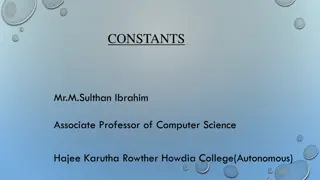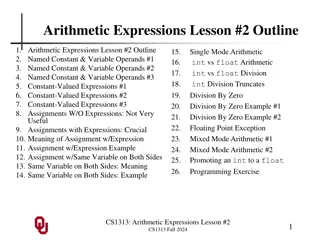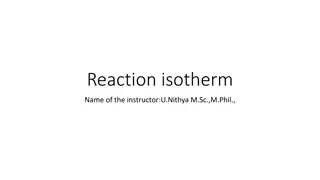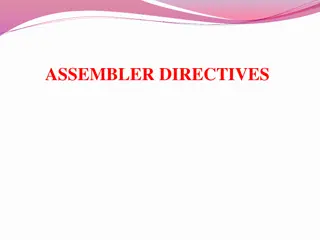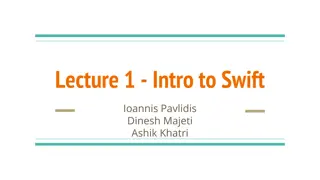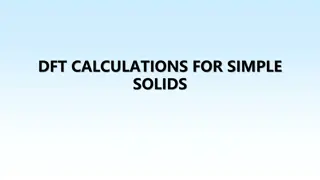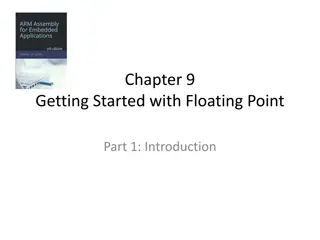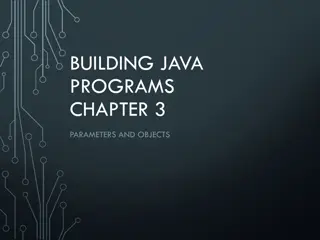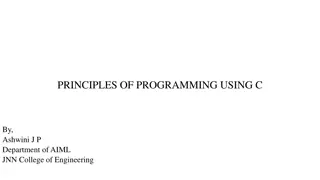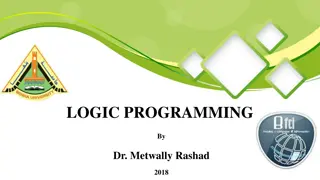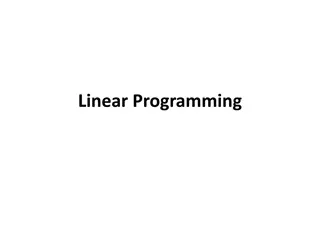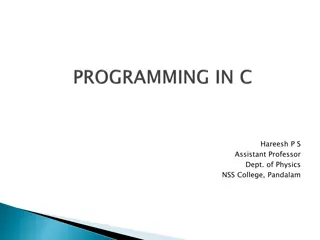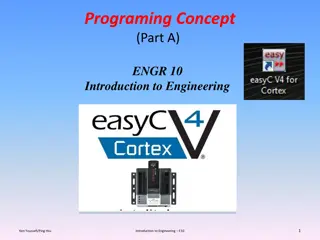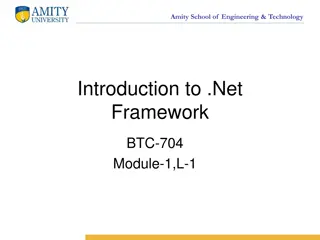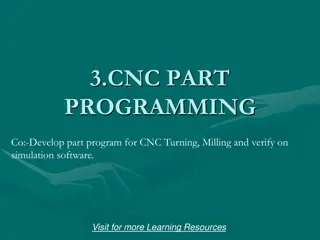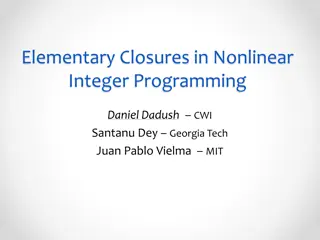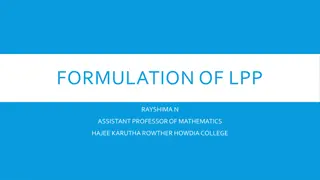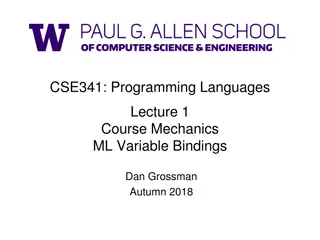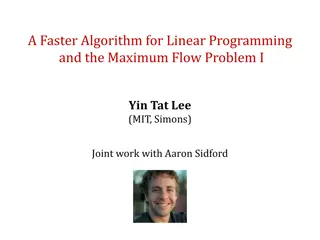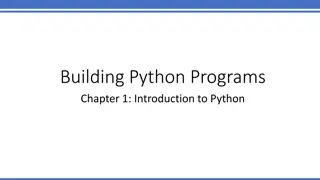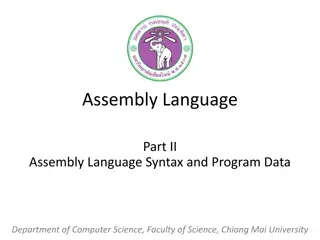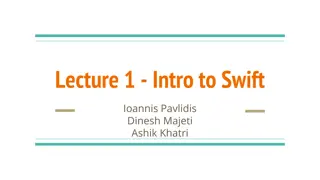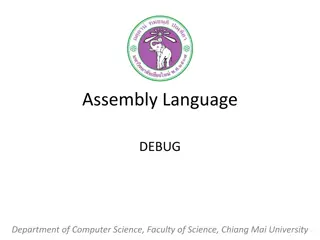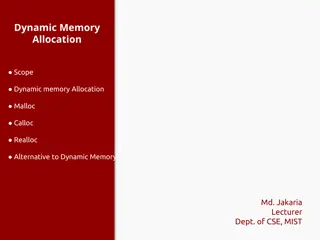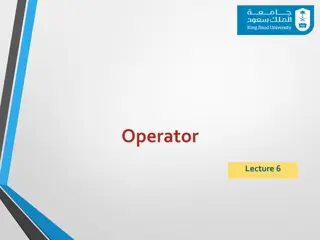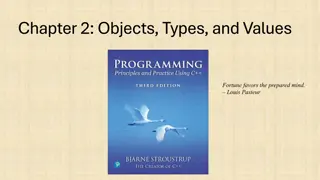Understanding Constants in Programming
Constants in programming are values that remain fixed throughout the execution of a program, unlike variables whose values can change. This lesson outline covers the definition of constants, the difference between variables and constants, categories of constants (literal and named), examples of literal and named constants, and the importance of using named constants over numeric literal constants in programming. Explore the significance and implementation of constants through various programming examples discussed in this lesson.
Download Presentation

Please find below an Image/Link to download the presentation.
The content on the website is provided AS IS for your information and personal use only. It may not be sold, licensed, or shared on other websites without obtaining consent from the author. Download presentation by click this link. If you encounter any issues during the download, it is possible that the publisher has removed the file from their server.
E N D
Presentation Transcript
Constants Lesson Outline 1. 2. 3. Constants Lesson Outline What is a Constant? The Difference Between a Variable and a Constant Categories of Constants: Literal & Named Literal Constants Literal Constant Example Program #1 Literal Constant Example Program #2 Literal Constant Example Program #3 Literal Constant Example Program #4 Named Constants Name Constant Example Program The Value of a Named Constant Can t Be Changed 13. Why Numeric Literal Constants Are BAD BAD BAD 1997 Tax Program with Numeric Literal Constants 1999 Tax Program with Numeric Literal Constants Why Named Constants Are Good 1997 Tax Program with Named Constants 1999 Tax Program with Named Constants 14. 4. 15. 5. 6. 16. 17. 7. 8. 18. 9. 10. 11. 12. Constants Lesson CS1313 Fall 2024 1
What is a Constant? In mathematics, a constantis a value that cannot change. In programming, a constant is like a variable, EXCEPT its value cannot change. Constants Lesson CS1313 Fall 2024 2
The Difference Between a Variable and a Constant The difference between a variable and a constant is: a variable s value can vary, but a constant s value is constant. Note that the variable can vary, and the constant s value is constant, at runtime. Constants Lesson CS1313 Fall 2024 3
Categories of Constants: Literal & Named There are two categories of constants: literal constants, whose values are expressed literally; named constants, which have names. Constants Lesson CS1313 Fall 2024 4
Literal Constants A literal constantis a constant whose value is expressed literally: int literal constants EXAMPLES: 5, 0, -127, +403298, -385092809 float literal constants EXAMPLES: 5.2, 0.0, -127.5, +403298.2348, -3.85092809e+08 char literal constants EXAMPLES: 'A', '7', '?' character stringliteral constants EXAMPLES: "A", "Henry", "What's it to ya?" Constants Lesson CS1313 Fall 2024 5
Literal Constant Example Program #1 % cat tax1997_literal.c #include <stdio.h> int main () { /* main */ float income, tax; printf("I'm going to calculate the federal income\n"); printf(" tax on your 1997 income.\n"); printf("What was your 1997 income in dollars?\n"); scanf("%f", &income); tax = (income - (4150.0 + 2650.0)) * 0.15; printf("The 1997 federal income tax on $%2.2f\n", income); printf(" was $%2.2f.\n", tax); } /* main */ % gcc -o tax1997_literal tax1997_literal.c % tax1997_literal I'm going to calculate the federal income tax on your 1997 income. What was your 1997 income in dollars? 20000 The 1997 federal income tax on $20000.00 was $1980.00. Constants Lesson CS1313 Fall 2024 6
Literal Constant Example Program #2 % cat tax1997_literal.c #include <stdio.h> int main () { /* main */ float income, tax; printf("I'm going to calculate the federal income\n"); printf(" tax on your 1997 income.\n"); printf("What was your 1997 income in dollars?\n"); scanf("%f", &income); tax = (income - (4150.0 + 2650.0)) * 0.15; printf("The 1997 federal income tax on $%2.2f\n", income); printf(" was $%2.2f.\n", tax); } /* main */ % gcc -o tax1997_literal tax1997_literal.c % tax1997_literal I'm going to calculate the federal income tax on your 1997 income. What was your 1997 income in dollars? 20000 The 1997 federal income tax on $20000.00 was $1980.00. Numeric literal constants Constants Lesson CS1313 Fall 2024 7
Literal Constant Example Program #3 % cat tax1997_literal.c #include <stdio.h> int main () { /* main */ float income, tax; printf("I'm going to calculate the federal income\n"); printf(" tax on your 1997 income.\n"); printf("What was your 1997 income in dollars?\n"); scanf("%f", &income); tax = (income - (4150.0 + 2650.0)) * 0.15; printf("The 1997 federal income tax on $%2.2f\n", income); printf(" was $%2.2f.\n", tax); } /* main */ % gcc -o tax1997_literal tax1997_literal.c % tax1997_literal I'm going to calculate the federal income tax on your 1997 income. What was your 1997 income in dollars? 20000 The 1997 federal income tax on $20000.00 was $1980.00. Character string literal constants Character string literal constants Constants Lesson CS1313 Fall 2024 8
Literal Constant Example Program #4 % cat tax1997_literal.c #include <stdio.h> int main () { /* main */ float income, tax; printf("I'm going to calculate the federal income\n"); printf(" tax on your 1997 income.\n"); printf("What was your 1997 income in dollars?\n"); scanf("%f", &income); tax = (income - (4150.0 + 2650.0)) * 0.15; printf("The 1997 federal income tax on $%2.2f\n", income); printf(" was $%2.2f.\n", tax); } /* main */ % gcc -o tax1997_literal tax1997_literal.c % tax1997_literal I'm going to calculate the federal income tax on your 1997 income. What was your 1997 income in dollars? 20000 The 1997 federal income tax on $20000.00 was $1980.00. Character string literal constants Numeric literal constants Character string literal constants Constants Lesson CS1313 Fall 2024 9
Named Constants A named constantis a constant that has a name: const float pi = 3.1415926; A named constant is exactly like a variable, except its value is set at compile time (by initializing it) and CANNOT change at runtime. A named constant is exactly like a literal constant, except it HAS A NAME. In a named constant declaration, we indicate that it s a constant via the constattribute, and we MUST initialize the named constant. Constants Lesson CS1313 Fall 2024 10
Name Constant Example Program % cat circlecalc.c #include <stdio.h> int main () { /* main */ const float pi = 3.1415926; const float diameter_factor = 2.0; float radius, circumference, area; printf("I'm going to calculate a circle's\n"); printf(" circumference and area.\n"); printf("What's the radius of the circle?\n"); scanf("%f", &radius); circumference = pi * radius * diameter_factor; area = pi * radius * radius; printf("The circumference is %f\n", circumference); printf(" and the area is %f.\n", area); } /* main */ % gcc -o circlecalc circlecalc.c % circlecalc I'm going to calculate a circle's circumference and area. What's the radius of the circle? 5 The circumference is 31.415924 and the area is 78.539810. Constants Lesson CS1313 Fall 2024 11
The Value of a Named Constant Cant Be Changed % cat constassign.c #include <stdio.h> int main () { /* main */ const float pi = 3.1415926; pi = 3.0; } /* main */ % gcc -o constassign constassign.c constassign.c: In function main : constassign.c:7: error: assignment of read-only variable pi You can t change the value of a named constant at runtime! This shows why you have to initialize every named constant: if you didn t initialize it, then its value would be garbage, forever. (By contrast, you DON T have to initialize every variable.) Constants Lesson CS1313 Fall 2024 This WON T WORK! 12
Why Numeric Literal Constants Are BAD BAD BAD When you embed numeric literal constants in the body of your program, you make it much harder to maintainand upgrade your program. Constants Lesson CS1313 Fall 2024 13
1997 Tax Program with Numeric Literal Constants % cat tax1997_literal.c #include <stdio.h> int main () { /* main */ float income, tax; printf("I'm going to calculate the federal income\n"); printf(" tax on your 1997 income.\n"); printf("What was your 1997 income in dollars?\n"); scanf("%f", &income); tax = (income - (4150.0 + 2650.0)) * 0.15; printf("The 1997 federal income tax on $%2.2f\n", income); printf(" was $%2.2f.\n", tax); } /* main */ % gcc -o tax1997_literal tax1997_literal.c % tax1997_literal I'm going to calculate the federal income tax on your 1997 income. What was your 1997 income in dollars? 20000 The 1997 federal income tax on $20000.00 was $1980.00. Constants Lesson CS1313 Fall 2024 14
1999 Tax Program with Numeric Literal Constants % cat tax1999_literal.c #include <stdio.h> int main () { /* main */ float income, tax; printf("I'm going to calculate the federal income\n"); printf(" tax on your 1999 income.\n"); printf("What was your 1999 income in dollars?\n"); scanf("%f", &income); tax = (income - (4300.0 + 2750.0)) * 0.15; printf("The 1999 federal income tax on $%2.2f\n", income); printf(" was $%2.2f.\n", tax); } /* main */ % gcc -o tax1999_literal tax1999_literal.c % tax1999_literal I'm going to calculate the federal income tax on your 1999 income. What was your 1999 income in dollars? 20000 The 1999 federal income tax on $20000.00 was $1942.50. Constants Lesson CS1313 Fall 2024 15
Why Named Constants Are Good When you use named constants in the body of your program instead of literal constants, you isolate the constant values in the declaration section, making them trivial to find and to change. Constants Lesson CS1313 Fall 2024 16
1997 Tax Program with Named Constants % cat tax1997_named.c #include <stdio.h> int main () { /* main */ const float standard_deduction = 4150.0; const float single_exemption = 2650.0; const float tax_rate = 0.15; const int tax_year = 1997; float income, tax; printf("I'm going to calculate the federal income tax\n"); printf(" on your %d income.\n", tax_year); printf("What was your %d income in dollars?\n", tax_year); scanf("%f", &income); tax = (income - (standard_deduction + single_exemption)) * tax_rate; printf("The %d federal income tax on $%2.2f\n", tax_year, income); printf(" was $%2.2f.\n", tax); } /* main */ % gcc -o tax1997_named tax1997_named.c % tax1997_named I'm going to calculate the federal income tax on your 1997 income. What was your 1997 income in dollars? 20000 The 1997 federal income tax on $20000.00 was $1980.00. Constants Lesson CS1313 Fall 2024 17
1999 Tax Program with Named Constants % cat tax1999_named.c #include <stdio.h> int main () { /* main */ const float standard_deduction = 4300.0; const float single_exemption = 2750.0; const float tax_rate = 0.15; const int tax_year = 1999; float income, tax; printf("I'm going to calculate the federal income tax\n"); printf(" on your %d income.\n", tax_year); printf("What was your %d income in dollars?\n", tax_year); scanf("%f", &income); tax = (income - (standard_deduction + single_exemption)) * tax_rate; printf("The %d federal income tax on $%2.2f\n", tax_year, income); printf(" was $%2.2f.\n", tax); } /* main */ % gcc -o tax1999_named tax1999_named.c % tax1999_named I'm going to calculate the federal income tax on your 1999 income. What was your 1999 income in dollars? 20000 The 1999 federal income tax on $20000.00 was $1942.50. Constants Lesson CS1313 Fall 2024 18


